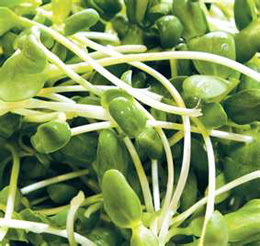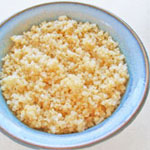Does Sprouting Increase Protein?
Posted By Savvy Veg On April 29, 2012 @ 1:08 pm In Food Blog,Health Blog,Nutrition,Veg Advice Blog,Veg Nutrition | 6 Comments
High intensity exerciser asks: does sprouting seeds increase protein?

Message for Savvy Vegetarian:
I have googled protein count when sprouting and there doesn’t seem to be much difference whether sprouting or not? You say sprouting increases protein availability by 30% and carbs decrease by 15%. If this is the case that would be great!
I am looking to increase my protein with plant food rather than meat when I do high intensity exercise.
Could you give me the actual protein count for let’s say kidney beans and rice when sprouting or could you direct me to find it myself? I would greatly appreciate it! Thank you very much! Nettie F.
Savvy Vegetarian Advice:
Hi Nettie, here are sprouting nutrition articles which will help answer your questions:
Health Benefits of Sprouted Grains [1]
Benefits of Sprouted Foods [2]
Sprouting and Nutrition
What sprouting does is to increase the bio-availability of nutrients which may be latent or bound up in the seeds, and doesn’t add nutrients which don’t exist in the seeds - except for minerals which may be found in high concentrations in the soaking water.
So when you sprout a high protein food (e.g. mung beans), it increases the bio-availability of the protein in that food, as well as many other nutrients.
Carbs are converted partially into other nutrients (to feed the plant), as they would be if the seed were planted in soil - that’s why carbs decrease in sprouting.
The effects of sprouting seem to vary a lot from one food to another, so results aren’t predictable across the board, but overall sprouting is highly beneficial in improving nutrition and digestibility, with a few exceptions.
Some seeds fare better with sprouting than others. Mung beans make excellent sprouts, but apparently, alfalfa seeds, sorghum and kidney beans release toxins when sprouted.
According to ehow.com [3]: “Kidney beans should not be sprouted because they contain the high levels of the toxin phytohemagglutinin. When kidney beans are eaten raw or sprouted they can cause nausea, vomiting, diarrhea and other adverse health reactions. For this reason, you should always cook kidney beans before eating them. Black beans will not yield as many sprouts as other seeds, but you can still enjoy sprouted black beans.”
Thanks very much for your feedback! I’ve added the info I found for you to our article on The Joy of Sprouting [4]
All the best, Judith Kingsbury
Find Savvy Vegetarian on Facebook [5], Pinterest [6], and Twitter [7]
Article printed from Savvy Vegetarian Blog: http://www.savvyvegetarian.com/blog
URL to article: http://www.savvyvegetarian.com/blog/advice/sprouting-nutrition-does-sprouting-increase-protein/
URLs in this post:
[1] Health Benefits of Sprouted Grains: http://www.wholegrainscouncil.org/whole-grains-101/health-benefits-of-sprouted-grains
[2] Benefits of Sprouted Foods: http://www.ezinearticles.com/?Benefits-of-Sprouted-Foods&id=114242
[3] According to ehow.com: http://www.ehow.com/how_7739313_sprout-kidney-beans-black-beans.html#ixzz1tRkikUdX
[4] The Joy of Sprouting: http://www.savvyvegetarian.com/articles/joy-of-sprouting.php
[5] Facebook: http://www.facebook.com/pages/Savvy-Vegetarian/81951542055
[6] Pinterest: http://pinterest.com/judithkingsbury/
[7] Twitter: http://www.twitter.com/savvyveg
[8] Image: http://www.savvyvegetarian.com/blog/advice/blood-type-diets-vegetarian-diet-energy-nutrition/
[9] Image: http://www.savvyvegetarian.com/blog/advice/food-safety-tips-food-spoilage/
[10] Image: http://www.savvyvegetarian.com/blog/advice/going-vegan-on-a-tight-budget/
Click here to print.


